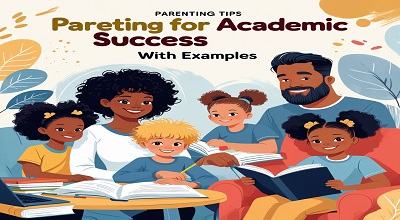Parenting Tips for Academic Success
Parenting Tips for Academic Success: Every parent wants their child to succeed academically. But achieving this requires more than just enrolling them in a good school. Parenting plays a crucial role in shaping a child’s learning habits, motivation, and overall academic performance. This article explores the latest research-backed parenting tips for academic success, complete with real-life examples to help you implement these strategies effectively.
The Role of Parents in Academic Success
Parents are a child’s first teachers. Their involvement in education significantly impacts a student’s performance. Studies show that children with engaged parents tend to:
- Have higher grades and test scores
- Develop better social and problem-solving skills
- Exhibit improved behavior in school
- Show greater motivation to learn
By adopting the right strategies, parents can foster an environment that nurtures academic excellence.
Effective Parenting Strategies for Academic Excellence
1. Creating a Structured Study Environment
A well-organized study space minimizes distractions and enhances focus.
Example:
- The Johnson family designated a quiet corner in their home with a desk, proper lighting, and essential supplies. Their child’s grades improved as he developed a consistent study routine.
2. Encouraging a Growth Mindset
Teach children that intelligence can be developed through effort.
Example:
- Instead of saying, “You’re so smart,” say, “I’m proud of how hard you worked on this project.”
3. Setting Realistic Goals
Break down academic targets into achievable steps.
Example:
- A parent helps their child set a goal of reading one book per month, gradually increasing the difficulty level.
4. Promoting Healthy Study Habits
- Use the Pomodoro Technique (25-minute study sessions with 5-minute breaks).
- Encourage note-taking and self-quizzing.
5. Balancing Academics and Extracurricular Activities
Over-scheduling can lead to burnout.
Example:
- A student excels in both academics and sports because their parents ensure a balanced schedule.
Communication Techniques for Better Learning
Active Listening
- Pay full attention when your child discusses school challenges.
Positive Reinforcement
- Reward effort, not just results.
Open Dialogue with Teachers
- Attend parent-teacher meetings and collaborate on improvement plans.
Technology and Academic Success
Using Educational Apps
- Apps like Khan Academy and Duolingo enhance learning.
Limiting Screen Time
- Set boundaries to prevent distractions from social media and games.
Nutrition and Brain Development
A balanced diet improves concentration and memory.
- Include omega-3s (fish, nuts), whole grains, and fruits.
Emotional Support and Mental Well-being
- Reduce academic pressure and encourage open discussions about stress.
Case Studies: Real-Life Examples
- Case Study 1: A student improved from C’s to A’s after her parents implemented structured study sessions.
- Case Study 2: A boy with ADHD thrived academically after his parents used reward-based learning.
Common Mistakes Parents Should Avoid
- Micromanaging homework
- Comparing children to siblings or peers
- Ignoring signs of burnout
Conclusion
Parenting for academic success involves a mix of structure, encouragement, and emotional support. By applying these strategies, parents can help their children achieve their full potential.
FAQs
1. How much parental involvement is too much?
Over-involvement, such as doing a child’s homework, can hinder independence. Support should be guiding, not controlling.
2. What if my child is not motivated to study?
Find their interests and relate academics to real-life applications. Reward effort, not just grades.
3. How can working parents support academic success?
Even with limited time, setting a routine and checking in daily can make a difference.
4. Are rewards effective for academic performance?
Yes, but focus on intrinsic motivation (e.g., “You must be proud of yourself”) rather than excessive material rewards.
5. How do I handle academic failure constructively?
Discuss what went wrong, create an improvement plan, and emphasize learning from mistakes.
Downliad Link: Thadingyut APK
